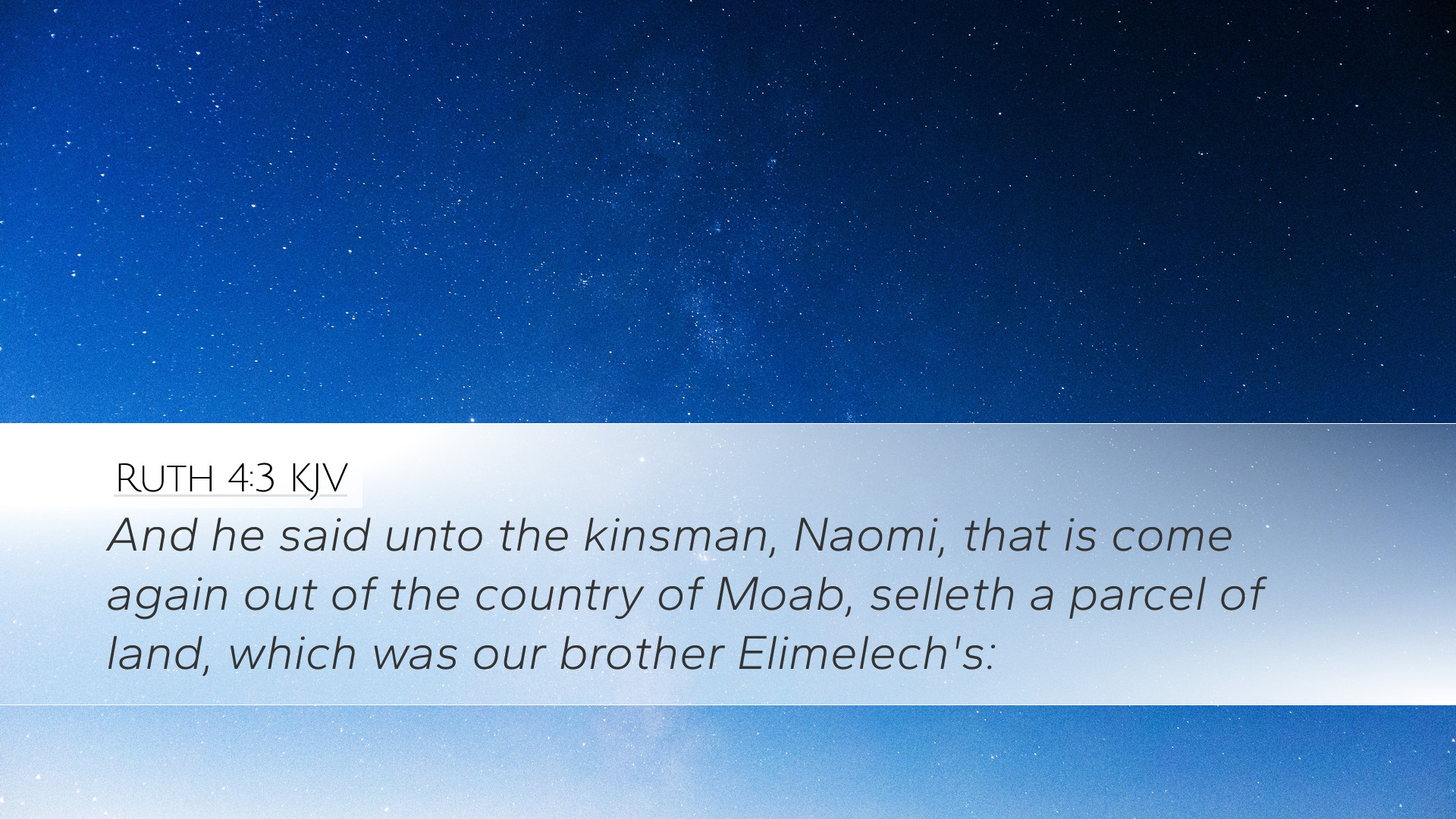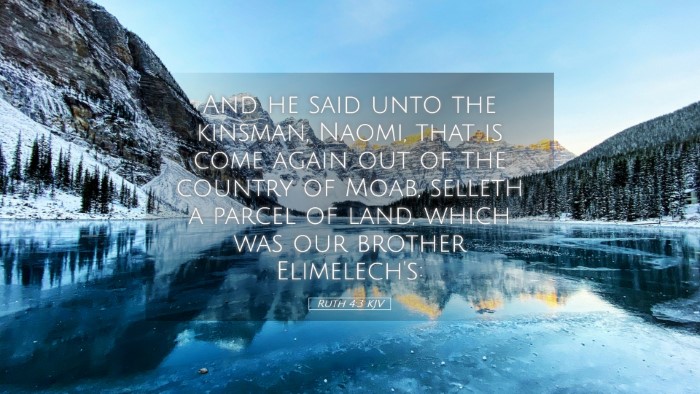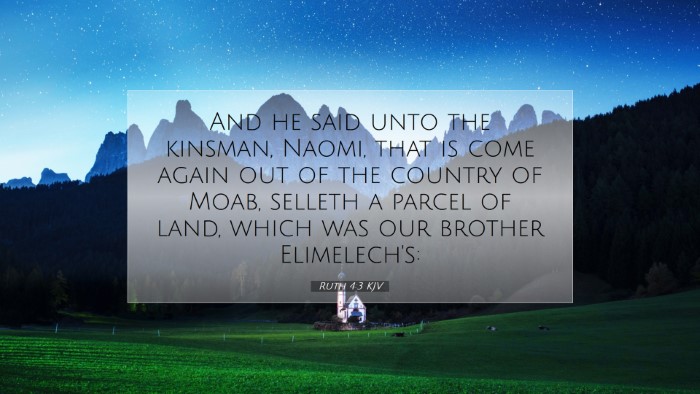Old Testament
Genesis Exodus Leviticus Numbers Deuteronomy Joshua Judges Ruth 1 Samuel 2 Samuel 1 Kings 2 Kings 1 Chronicles 2 Chronicles Ezra Nehemiah Esther Job Psalms Proverbs Ecclesiastes Song of Solomon Isaiah Jeremiah Lamentations Ezekiel Daniel Hosea Joel Amos Obadiah Jonah Micah Nahum Habakkuk Zephaniah Haggai Zechariah MalachiRuth 4:3
Ruth 4:3 KJV
And he said unto the kinsman, Naomi, that is come again out of the country of Moab, selleth a parcel of land, which was our brother Elimelech's:
Ruth 4:3 Bible Commentary
Commentary on Ruth 4:3
Ruth 4:3 states: "And he said unto the kinsman, Naomi, that is come again out of the country of Moab, selleth a parcel of land, which was our brother Elimelech's." This verse is pivotal in the narrative of Ruth, marking the juncture where Boaz approaches the nearest kinsman to discuss the redemption of Naomi's land and the implications of marrying Ruth.
Contextual Overview
This verse is set against the backdrop of Israel's kinship laws concerning redemption and levirate marriage. Establishing the significance of land in ancient Israel, it alludes to familial responsibilities tied to property and lineage, aligning with God’s covenant promises to Israel.
Background of Naomi and Ruth
Naomi, a widow who returned to Bethlehem from Moab, symbolizes loss and redemption. Ruth, her Moabite daughter-in-law, embodies loyalty and faithfulness. Their return marks the revival of hope for Naomi and a new beginning for Ruth, who has become a part of God's covenant people.
Insights from Public Domain Commentaries
Matthew Henry's Commentary
Matthew Henry emphasizes the providence of God in the redemption narrative, noting how the kinsman-redeemer system illustrates God's care for His people. In this verse, he highlights the importance of Boaz's declaration, establishing the responsibility of the nearest kinsman. Henry points out that the transaction of land was not merely a matter of property but involved familial lineage and the continuation of the name of Elimelech.
Henry also draws attention to the contrast between Boaz, who is willing to redeem, and the unnamed kinsman, who represents those who neglect their duties. This illustrates a deeper spiritual reality: that Christ, our Redeemer, is ever willing to undertake for us.
Albert Barnes' Notes
Albert Barnes elaborates on the legal context of the kinsman-redeemer concept. He explains how the kinsman had the right to purchase Naomi's land, which was likely a significant social obligation tied to the preservation of family heritage. Barnes discusses the importance of the land as it relates to the inheritance given to Israel, and how Boaz's intervention serves to protect and honor Naomi and Ruth.
He also notes that this act of redemption is not only about land but also about the familial bond, demonstrating how Ruth's loyalty to Naomi extends to this legal and social duty. This reflects the broader theological theme of God's redemptive plan, which often redeems not only individuals but also families and communities.
Adam Clarke's Commentary
Adam Clarke highlights the cultural practices surrounding the kinsman-redeemer role. He notes that the kinsman had the first right to redeem the property and marry Ruth, which introduces a nuanced understanding of social justice and responsibility in ancient Israelite society. Clarke emphasizes that while the land is significant, the redemption of Ruth is equally critical because it ties directly to the lineage of David and ultimately to Christ.
Clarke points out that this moment encapsulates the fulfillment of God's promise to provide for His people, showing God’s hand in the restoration of Naomi and Ruth. He also underscores the moral obligation and the ethical dilemmas faced by the kinsman, reflecting the human condition in dealing with spiritual responsibilities.
Theological Implications
This verse from Ruth 4:3 serves as a profound reminder of God's faithfulness in caring for His people through the covenantal relationships established in Israel. Several theological themes emerge:
- Redemption: Both literal land redemption and the deeper spiritual redemption reflect on Christ as our ultimate Redeemer.
- Faithfulness: Ruth’s loyalty to Naomi highlights the virtues of faithfulness and steadfast love, characteristic of God's own nature.
- Community and Kinship: The call for responsibility within the community encourages believers to support and uphold one another in faith.
- Providence: God's providential care is evident as He orchestrates the events that lead toward restoration and blessing.
Conclusion
In conclusion, Ruth 4:3 highlights a critical moment in the redemptive story of Israel, portraying the intersection of human responsibility and divine providence. The insights from the commentaries of Matthew Henry, Albert Barnes, and Adam Clarke provide depth to our understanding, showing how this seemingly simple transaction carries profound theological significance. For pastors, students, theologians, and Bible scholars, this verse is a rich source of reflection on God's redemptive work within the fabric of human relationships and community life.


